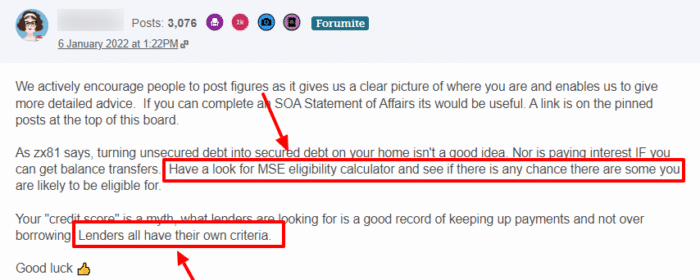Debt Consolidation Loans Eligibility – Complete Breakdown

A debt consolidation loan is a way to manage your debt by bringing all your debts together into one loan. This can make it easier to handle your money problems. But, to get a debt consolidation loan, you need to make sure you are eligible. Different things can affect your eligibility, like where you live, how old you are, and how good your credit is.
If you’re thinking about getting a debt consolidation loan, this article will help you understand what you need to know. Our website helps over 170,000 people each month to understand their money problems better. In this piece, we’ll share with you:
- What a debt consolidation loan is.
- How to see if you can get one.
- The real cost of a bad debt consolidation loan.
- How to get a debt consolidation loan even if you have bad credit.
- Some questions people often ask about debt consolidation loans.
We know it can be hard to worry about unpaid debts, but we’re here to help. Let’s learn about debt consolidation loans together.
Am I Eligible for a Debt Consolidation Loan?

You have to go through a few conditions to determine if you’re eligible for a debt consolidation loan. Here’s a thorough breakdown.
- You have been a resident of the UK for at least three years
- You’re older than 21 and not older than 70 at the time when the loan expires
- You have a good credit rating
- You don’t anticipate any potential changes to your income that could severely impact your ability to obtain credit in the future and pay your loan back
- You can ensure that you are able to meet the repayments in time since missed payments will have harmful consequences for your image as a borrower
- You have a regular income of more than £12,000 a year
- You don’t have a history of County Court Judgements or bankruptcy
- You have a bank based in the UK or a Building Society account that can pay direct debits.
If you meet all these requirements, you can apply for debt consolidation loans.
Do Debt Consolidation Loans Hurt Your Credit Score?
Yes, debt consolidation loans can hurt your credit score.
For one, when you apply for a credit loan, a “hard search” is performed on your credit report.
It usually brings down your credit rating, but temporarily. So you don’t have to worry about it too much.
Secondly, if you get a consolidation loan you can’t handle and miss monthly payments on it, your credit rating will most likely go down.
Regular payments have a strong effect on bringing up your credit rating, and missing them can damage your credit report.
Even though debt consolidation loans can hurt your credit score, this is mostly caused by negligence and miscalculation on the debtor’s part.
Lender |
APRC |
Monthly payment |
Total amount repayable |
|---|---|---|---|
| United Trust Bank Ltd | 5.99% |
£218.73 |
£26,247.92 |
| Pepper Money | 6.86% |
£220.24 |
£26,429.17 |
| Together | 6.95% |
£220.40 |
£26,447.92 |
| Selina | 7.5% |
£221.35 |
£26,562.50 |
| Equifinance | 7.7% |
£221.70 |
£26,604.17 |
| Spring | 10.5% |
£226.56 |
£27,187.50 |
| Loan Logics | 11.2% |
£227.78 |
£27,333.33 |
| Evolution | 11.28% |
£227.92 |
£27,350.00 |
Representative example: If you borrow £34,000 over 15 years at a rate of 8.26% variable, you will pay 180 instalments of £370.70 per month and a total amount payable of £66,726.00. This includes the net loan, interest of £28,531.00, a broker fee of £3,400 and a lender fee of £795. The overall cost for comparison is 10.8% APRC variable. Typical 10.8% APRC variable.
Search powered by our partners at LoansWarehouse.
Check If You’re Eligible for a Debt Consolidation Loan
One of the biggest questions about debt consolidation loans is the list of criteria that determine whether one is eligible to apply.
You should also prequalify with different lenders to see what rates you qualify for without affecting your credit score.
Get a Debt Consolidation Loan with Bad Credit – Possible Options
Okay, so let’s say you have bad credit and you need to borrow a debt consolidation loan. What can you do about it? Let’s take a look.
1. Be aware of your credit report
Your credit rating is the most critical factor in determining whether you can borrow and the terms at which you’ll be offered loans.
There’s a minimum credit rating that you need to stay above if you want to qualify for a consolidation loan.
There are lots of free tools out there that allow you to view the most recent version of your credit report. Several banks will allow you access to these tools.
2. Explore multiple fronts
Don’t limit your options.
Bad credit can make you feel like you don’t have any options available and that you should accept the first offer you come across.
I suggest that you put in the time and effort to look around and find better alternatives.
You should go about comparing and contrasting interest rates, prices, and the terms of the debt.
There are multiple ways to do this. Use MoneySavingExpert or CompareTheMarket to search your options and best deals.
Alternatively, apply with at least three lenders that offer debt consolidation loans for people with your credit score. This pre-qualification period allows you to submit your information and see what rates you qualify for without affecting your credit score.
3. Try secured loans
If you have bad credit, a secured loan may be the best option for you.
A secured loan is one where you put up an asset of yours as collateral against the loan.
Generally, a secured loan is easy to get and doesn’t rely too much on your credit rating as much as a debt that isn’t secured. Also, you’ll get it at lower interest than a loan that isn’t secured, even if you don’t really have a good credit rating.
If you have bad credit, you will usually be asked to put up an asset against the loan since you’re seen as an unreliable borrower.
4. A good credit rating never hurts
Having a good credit score is central to getting a consolidation loan.
So, if you have bad credit, you should be doing everything you can to bring your credit rating back up.
The best way to do this is to make regular payments on your loans.
Your credit report is usually the first thing creditors check when they’re debating whether they should give you a loan.
Debt consolidations loans for all purposes
- Stuck paying high interest on credit card debts & loans?
- Looking for a better interest rate?
- Stuck with the confusion of multiple repayment plans?

Polly
“This was by far possibly one of the nicest experiences I’ve had getting a secured loan.”
Reviews shown are for Loans Warehouse. Search powered by Loans Warehouse.
Frequently Asked Questions About Debt Consolidation
How much can you borrow on a debt consolidation loan?
In general, you can borrow anywhere from around £500 to £35,000 on a debt consolidation loan.
However, there are some lenders that will lend you up to £50,000, depending on your credit report and your borrowing history.
How long does debt consolidation stay on your credit report?
In the UK, consolidation loans will stay on your credit report for a period of six years after you pay them off or default on them.
What is the smartest way to consolidate debt?
The best ways to consolidate debt are usually ones where you can get a big loan at a very low interest rate.
If so, you can use it to pay off any existing debts and then pay back the consolidated loan, which will normally be much less than the total amount you’d have to pay on your original debts.
When should I not consolidate debts?
There are two common situations where you don’t consolidate your debts.
The first is if you’re overwhelmed by debt, and consolidation loans just won’t do the trick. If you can’t pay back your loans even with debt consolidation, consider a debt management plan or insolvency.
The second is when you have a debt amount that you think you can pay back in less than a year’s time. If that is indeed the case, you’re better off avoiding the burdens, charges, and fees that come with debt consolidation.
Can I get an unsecured debt consolidation loan?
Yes.
You can get an unsecured debt consolidation loan.
There are a few considerations, though.
For one, an unsecured debt consolidation loan is one you’ll usually get at a higher interest rate than a secured loan because you’re not putting up any asset of yours as collateral towards the loan.
Unsecured loans are harder to get than secured loans, especially if your credit rating is poor.
If you’re chased by debt collectors who want you to repay them, you need to figure out how to deal with them.


